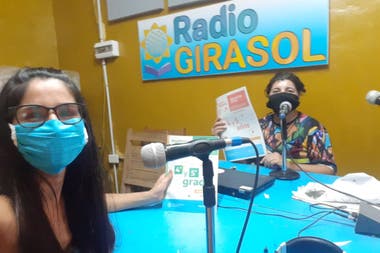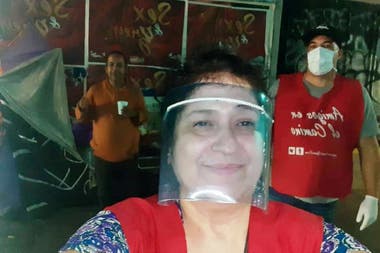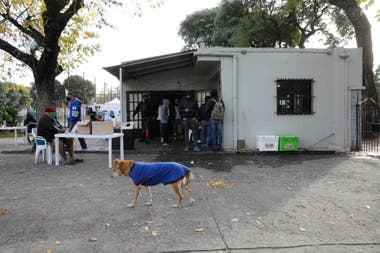Visit the homes of the students to bring them the printed tasks, put together personalized content on WhatsApp or teach classes through the school radio. These are just some of the
strategies
that thousands of Argentine teachers had to put into practice in the midst of an unforeseen and exceptional context: for almost two months, schools have stopped working as we know them. The quarantine to prevent the spread of COVID-19 meant that, from one day to the next, teaching and learning methods had to adapt to the barriers imposed by the
distance and scarcity of resources
, especially in the case of those students who do not have Internet and, sometimes, neither with a telephone signal.
In the country, 19.5% of primary school students and 15.9% of high school students
do not have internet access at home
, according to the latest report of the Observatory
Argentines for Education
. And even among those who do have a connection, it may not be adequate to be able to keep classes at a distance.
LA NACION proposed to its readers to send stories of teachers and principals who give their all in order to continue guaranteeing the right to education for their students, containing families and building ties of mutual aid. From the north to the south of the country, we share some of them.
Noemí Medina: “Radio became a space for mutual learning”
-
Age:
45 years. -
Institution
: School No. 829 Sixto Sena. -
Location:
Pampa Sena, Chaco.

In the rural area of Pampa Sena, 25 kilometers from Tres Isletas, in Chaco, there is school No. 829 Sixto Sena. There, in a green and wooded environment, 16 students attend the initial level, 37 at the primary level and 56 at the secondary level. It is the only institution in the area that has an educational offer for the secondary level, so boys and girls from different places
they travel several kilometers every day
to be able to attend classes.
Noemí Medina, director of school No. 829 Sixto Sena in the rural area of Pampa Sena, 25 kilometers from Tres Isletas, in Chaco, had to find different strategies so that her students could continue studying.
01:28
Since the quarantine began, its director, Noemí Medina, who is 45 years old and has been a teacher for 25 years, began to think about the best way to continue reaching all her students, since families
they don’t have internet in their houses
and only a few have a cell phone signal or data to access, for example, WhatsApp.
Along with the accompaniment of the civil association
I go with you
-who works in 20 rural schools in the Tres Isletas and El Impenetrable area to guarantee the right to education-, the idea arose to continue classes through the school radio. “In these
two hour programs
I am in contact with the students’ knowledge, their difficulties and concerns about the different subjects and contents that they are going to send me, when they can and manage to access the signal, by text message, “says Noemí.
According to the Argentine Observatory for Education, at the primary level there are seven Argentine provinces where a third of the students or more do not have Internet at home: Santiago del Estero (40.7%), Formosa (37.7%), San Juan (36.1%), Catamarca (35.0%), Misiones (35.0%), Chaco (33.5%) and Corrientes (33.3%).
In addition to school content, radio became a medium – in many cases, the only one – for
inform families about the pandemic
and prevention methods. Another tool that Naomi uses is ”
canticuentos ”
(recorded stories) with activities. In addition, together with his teaching team, he prepared personalized booklets for each student, taking into account their careers and difficulties, and being guided by the proposals of the platform of the Ministry of Education of the province and the Nation.

15 families live in Pampa Sena. Most of them are day laborers, are engaged in raising poultry or elaborate charcoal, while a minority are stalls in fields in the area. “What I like most about teaching is the contact I have daily with families, their realities, their culture and idiosyncrasy, and the vocation that makes me do my best to improve the learning and educational quality of the students, “says Noemi, who lives at the school with her husband and daughter.
Last year, the director of Pampa Sena was awarded an Illustrious Teacher by the Province of Chaco by the Ministry of Education. What worries him most about the post-quarantine is that the students have not been able to “connect with knowledge” due to multiple barriers: “Some families are not able to accompany them for what they do at home or in the bush, and
many dads and moms cannot read or write.
On the other hand, the lack of connectivity and signal makes it impossible for one to do a significant follow-up and accompaniment at a distance, “says Noemí. And he concludes:” The response of the boys to the radio program motivates me to continue growing in this that for me it’s new. I hope that more families join us and that we can recognize school radio as a
space for personal growth and learning
mutual”.
Nancy Sánchez: “WhatsApp became a great ally”
-
Age:
53 years. -
Institution:
School No. 4 D.E 2 Amadeo Jacques. -
Location:
Buenos aires city.

Nancy Sánchez never imagined that an application, WhatsApp, could become its fundamental ally – indispensable – for teaching, in its “bond of encounter” with its students and families in a context where contention, even if at a distance , it’s key.
The school where he teaches is Nº 4 Amadeo Jacques, in Palermo, the heart of the city of Buenos Aires. Although it is one of the jurisdictions where, according to the latest report by Argentines for Education, students have greater Internet connectivity in their homes (of those who attend primary or secondary level only 7.2% do not have the himself), Nancy explains that a considerable number of her students
don’t have this resource
.
“30% are families from the suburbs, the mothers work as domestic workers in Palermo and decide to take their children to school near their work. They are children who get up very early and all meals are made at school. Others, they are the children of neighborhood building managers and a smaller percentage of the parents are professionals, “says Nancy, who is a 4th and 5th grade teacher.
Starting in 5th grade, the boys have netbooks and can connect to the internet with any Wi-Fi from a state school that is close to their home, making it easier for them to access the virtual platform where classes are held. However, with the 4th grade it was complicated, since they do not have that possibility and, in many cases,
they don’t have computers
in their houses. “We depend on whether a family member has a cell phone, the issue is that they have data,” summarizes Nancy.
Faced with this reality, teachers organized to send activities twice a week, to make it easier for them to find a way to download them, and Nancy deals with making video calls on Whatasapp from her phone, so her students do not spend data. They are private classes or in small groups, but for that application. “I have schedules to work individually and, in other cases, with two or three boys who have the same difficulties. In sheets
I make ‘blackboards’ and show them to you on the screen
: Afterwards, I take pictures of them and send them to them so they can fit “, describes Nancy.
Nancy, who graduated as a teacher at the age of 40 (she had previously studied as a kindergarten teacher), says that her task and that of the Amadeo Jacques school team goes far beyond guaranteeing the pedagogical content. Among other issues, the teachers organized to bring to those families who cannot pick them up, house by house, the food bags that the government delivers in schools. “Some live in the suburbs and do not have to load the SUBE. With
teachers collect money
together to give a hand to those who are in a situation of greater vulnerability, “he says.
Maintaining links between teachers, students and families is essential for her. “The boys wait for video calls every day to see you. When they are all in front of the screen, I go out and enter as if they were in the classroom and say:
‘Good morning, fifth grade!’
Those little details for them are very important, “concludes the teacher.
Benoit Andrieu: “There are families who live in the middle of the plateau, without electricity”
-
Age:
38 years. -
Institution:
Agrotechnical Educational Center (CAE) of the Fundación Cruzada Patagónica. -
Location:
Cholila Valley, Chubut.
Benoit Andrieu is the head of practical teaching, machinery and professional practices teacher at the Centro Educativo Agrotécnico (CAE) de la
Patagonian Crusade Foundation
in the Cholila Valley, Chubut. Created in 2008, 170 students attend, of whom 70 live in their residences. These boys and girls live in rural areas of the Chubut plateau such as Cushamen, Fofo Cahuel, Costa del Lepa and Aldea Epulef. Many of them do not have Internet access or cell phone signals in their homes, and others do not even have electric light.
At the secondary level, the highest proportions of students without Internet access are found in Salta (29.7%), Catamarca (29.5%), Formosa (29.5%), Misiones (29.4%), Corrientes (28.9%), Jujuy (28.7%), San Juan (27.8%), Santiago del Estero (26.8%) and Chaco (26.1%).
In this audio, Benoit tells of the solidarity chain that will be put together among families to be able to reach school content to those that are more isolated.
Claudia Manzano: “Everything is very good: that fills my heart”
-
Age:
48 years. -
Institution:
Olegario Víctor Andrade Private Secondary Institute (Ispova) -
Location:
Villa Retiro, Córdoba.

The Olegario Víctor Andrade Private Secondary Institute (Ispova) is on the outskirts of Córdoba Capital, in the Villa Retiro neighborhood. It is a peri-urban area and several of the school’s students – who have an initial, primary and intermediate level – live in places or small towns around Route A 74, such as Colonia Caroya, Colonia Tirolesa and Santa Elena.
“It is a route zone, with small populations where transportation is the long-distance bus. Several of the families have connectivity problems or lack of a computer, so
conditions are not optimal
to keep a school running from the virtual point of view “, says Claudia Manzano, a psycho-pedagogue, fifth-year psychology teacher and director of the intermediate level, attended by 612 students.
Claudia explains that at school there is “a lot of diversity”. Although it is privately managed, it has an accessible quota and its students are both sons or daughters of owners of fields in the area, as well as employees of those establishments. “We also have many students from families of Bolivian origin, some work in trade, others are professionals. It is a punished middle class of workers,” summarizes the teacher.
During the first days of the quarantine, with the bookstores and cyber rooms closed, the possibility that the booklets that the teachers prepare could reach the students without an internet connection, was thanks to a
collaboration network
that were tending students, teachers and families from the communities.
“We have students whose parents own a business that sells food and, therefore, it was open all the time. They, who did have the Internet, took care of downloading the material at home, printing it and taking it to the store so that they could withdraw your colleagues. It was a supportive way that we found to reach everyone, “says Claudia. With those students with connectivity, who are the majority, work in virtual classes. With those who cannot access them, WhatsaApp is used. “The same boys or teachers share cell phone data with those who do not have it. Everything is very good:
that filled my heart
Claudia says.
Verónica Palaoro: “Today we are more psychologists than teachers”
-
Age:
45 years. -
Institution:
school No. 8 Ricardo Gutiérrez. -
Location:
place Zapiola, Lobos, province of Buenos Aires.

The Monday after President Alberto Fernández announced the start of the quarantine on the national network, ten students from school No. 8 Ricardo Gutiérrez, in the area of Zapiola, province of Buenos Aires, showed up for classes. There, in Lobos, 100 kilometers from the obelisk, without television or Internet,
they had not heard anything
: Neither from compulsory isolation, nor from the threat of a pandemic.
“Most of the families work in the dairy farms, but there are others who make changas”, describes Verónica Palaoro, a 5th and 6th grade teacher and director of the school that has 50 students. And it continues: “The day the quarantine began, when some students who did not have any means of communication at home came to school, the teachers explained to the families about the pandemic and we prepared a series of activities for them to they were carrying because we didn’t know what was going to happen. ”
To follow up on them, she was in charge of going to see those 10 students offline every 15 days (the remaining 40 boys have access to cell phones with WhatsApp), when she brings them food bags and homework, and to communicate with your neighbors if any need arises.
When I go out to tour the field and the boys see my old truck and run to meet me: Here comes the lady!
Veronica Palaoro
One of the projects that emerged during the quarantine was a
“virtual garden”
, an idea of the Ricardo Gutiérrez school that the Lobos district took to implement in other institutions. Since most families have WhatsApp, the instructions are dictated by this means and the seeds they collected thanks to a contribution from INTA are distributed along with the food bags. Those families that do not have a cell phone receive the printed instructions from Claudia. Those who do not have space in their garden can make the garden in pots. The goal is that no one is left out.

“There is a lack of food, among others. Some do not have food, I contact the municipality that goes there and supplies it. All through WhatsApp, because
there is no sign in Zapiola.
Only two families have a landline phone, “describes the director.
He says that his concern is that, if the quarantine lengthens, there will be more boys who lose their means of communication, since some families are unable to pay for the Internet or cannot repair broken cell phones. “With the teachers, we print the missing booklets from our pockets and take them with us,” Claudia explains. “We have to continually contain families, maintaining communication to see how they feel. The pedagogical is important, but today we are more psychologists than teachers. ”
ALSO


.
Publicado en el diario La Nación




